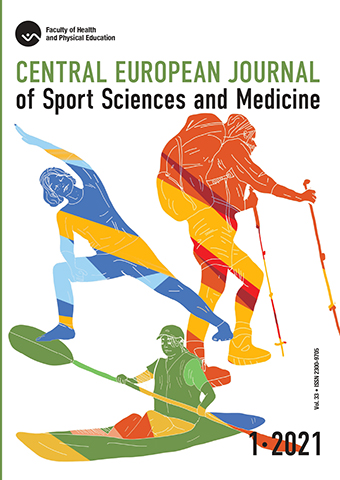
ISSN: 2300-9705
eISSN: 2353-2807
OAI
DOI: 10.18276/cej.2021.1-02




Lista wydań /
Vol. 33, No. 1/2021
Impact of European Union programs on the activities of the Third Polish Republic’s Parliament in the field of sport in the years 2004-2007
| Autorzy: |
Leonard
Nowak

University of Szczecin, Faculty of Health and Physical Education, Institute of Physical Culture Sciences, Poland Maria Alicja Nowak 
University of Szczecin, Faculty of Health and Physical Education, Institute of Physical Culture Sciences, Poland |
| Słowa kluczowe: | Programs of the European Union Polish Parliament sport |
| Data publikacji całości: | 2021 |
| Liczba stron: | 9 (17-25) |
Abstrakt
The aim of this paper is to show the impact of European Union programs on the activities of the Third Polish Republic’s Parliament in the field of sport in the years 2004-2007.
The Republic of Poland joined the European Union (EU) on 1 May 2004. Since then, it has been co-creating the image of sport in Europe. All activities undertaken by the Polish Parliament in the development of sport after this event were related to programs in the European Union.
During the period covered in this paper, the institutions involved in sport in the European Union included the Council of the European Union, the European Parliament, the European Commission and the European Court of Justice.
One year after Poland’s accession to the European Union, elections were held for the fifth term of the Polish Sejm (2005-2007). The representatives of the Polish Parliament, during meetings of the Physical Culture and Sport Committee, repeatedly pointed to the possibility of adapting EU programs and their use in the development of sport in Poland. The material presented by the Ministry of Sport and the Office of the European Integration Committee in Warsaw informed about the following programs (mainly investment ones): Sport in the structures of the European Union and European Union Programs for the development of sport, implemented between 2004 and 2006.
The most important issues raised by the Committee were those contained in the two most important documents: White Paper on Sport and Independent European Sport Review.
As a result of the work of the Parliament of the Republic of Poland during the fifth term of office (2005-2007) in cooperation with the Ministry of Sport and the Parliamentary Physical Culture and Sport Committee, a plan for co-financing projects for the construction, extension or modernization of sports infrastructure under the EU structural programs and the INTERREG III A and EQUAL Community Initiatives was developed.
The effect of Poland’s membership in the EU in that period was a gradual elimination of infrastructural negligence and undertaking activities related to the activation of local communities in the area of education and sport. Poland’s membership in the EU so far has brought positive results: increased accessibility of sport thanks to the development of regional infrastructure co-financed by the EU funds and the enrichment of the program offer by supporting projects related to the organization of extracurricular sports activities for children and young people. The positive effects of membership in the field of sport are still being perceived by selected groups and society as a whole.
Pobierz plik
Plik artykułu
Bibliografia
| 1. | Bulletin No. 1766/V, pos. No. 70 of the Physical Culture and Sport Committee dated 23.03.2007. |
| 2. | Central Statistical Office (2008), Polish Statistical Pocketbook [Mały rocznik statystyczny Polski]. Warsaw. |
| 3. | Eurobarometer, Citizens of European Union and sport. Special Eurobarometer 213, November 2004, p. 3. (accessed on 23.01.2019). |
| 4. | http://dms.msport.gov.pl/app/document/file/448/ lista_pkt_Kontaktowych_IE.pdf?field= file1 (25.01.2019). |
| 5. | http://ec.europa.eu/dgs education_culture/index_en.htm (21.01.2019). |
| 6. | http://ec.europa.eu/sport/pdf/doc244_en.pdf (2.01.2019). |
| 7. | http://msport.gov.pl/sport-w-unii-europejskiej/360-Sport-w-strukturach-UE?retpag=/sport-w-unii-europejskiej (23.01.2019). |
| 8. | http://www.europarl.europa.eu/factsheets/pl/sheet/143/sport (5.02.2019).https://eur-lex.europa.eu/legal-content/PL/TXT/PDF/?uri=CELEX:52007DC0391&from=GA (5.02.2019). |
| 9. | https://mfiles.pl/pl/index.php/Traktat_Nicejski (26.01.2019). |
| 10. | https://msit.gov.pl/pl/sport/uczciwosc-i-bezpieczens/antydoping/609,Unia-Europejska-a-doping-w-sporcie.html (27.01.2019). |
| 11. | https://uokik.gov.pl/download.php?plik=6354 (23.01.2019). |
| 12. | Journal of Laws of 2007 No. 142, item 999. |
| 13. | Kałużyńska, M., Smyk, K., Wiśniewski, J. (eds.) (2009). 5 years of Poland in the European Union (pp. 294–308). Office of the European Integration Committee, Chapter: Education and Sport. Warsaw. |
| 14. | Kolos, A. (2011). The problems of sport in the activity of the Sejm Physical Culture and Sport Committee in the 5th term of the Sejm of the Republic of Poland in the years 2005 –2007. Amaster’s thesis, Faculty of Physical Culture in Gorzów Wlkp. |
| 15. | Name of the operational program: ZPORR, 3.5 Local social infrastructure Project value: PLN 18,822,873.19, Value of European Union contribution: PLN 5,740,000.00, Ministry of Regional Development, Impact of the Structural Funds and the Cohesion Fund on the Polish economy in 2004 – 1st half of 2007, Warsaw, February 2008, 60–61.Official Journal (2000) C 356 of 12.12, p. 1. |
| 16. | Official Journal (2001a) C 135 of 07.05, p. 270.Official Journal (2001b) C 135 of 07.05, p. 274. |
| 17. | Official Journal (2004a) No. 90, item 864.Official Journal (2004b) No. 90, item 864/30. |
| 18. | Official Journal of the EU C 306 z, p. 1.Official Journal of the EU C 321E z, p. 37. |
| 19. | Official Journal of the EU C 83 z, p. 13.Official Journal of the EU C 83 z, p. 47. |
| 20. | Official Journal of the European Union (2006) 09.02.P6_TA (2005) 013. |
| 21. | The World Health Organization (2002). The World Health Report 2002. Reducing risk; promoting healthy lifestyle. Geneva. |
| 22. | Tomaszewicz, Ł., Świeczewska, I., Strawiński, P., Kulczycka, J. (eds.)(2010). Sport Satellite Account for Poland. Report commissioned and financed by the Ministry of Sport and Tourism, Institute of Public Statistics, Central Statistical Office. Warsaw, December. |
| 23. | Żyśko, J. (2009a). European model of sport and sport management systems in Poland and other countries. Warsaw. |
| 24. | Żyśko, J. (2009b). Presentation on: European model of sport and sport management systems in Poland and other countries (Slide: 14, 15). Warsaw. |